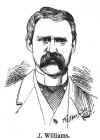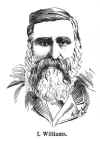he manifested a deep interest and like the true patriot that he was never failed to cast his vote for chief magistrate.
From his Quaker ancestors he inherited a dislike for slavery, so that when the abolition party was organized he at once became a leader in his neighborhood; his age prevented his going into the war but he sent all his
sons that were old enough, and it was his boast that he had five sons in-law in the war although he only had three daughters.
Perhaps the most striking characteristic of Mr. Williams was his strong and all-pervading religious life.
In 1839 he left the Quaker church and united with the Disciple or Christian church and throughout the remainder of his life was a most
consistent and honored member of that organization, being one of the elders at the time of his death.
With him religion was not a sentiment but a controlling force; the Bible not a book of mystery but a revelation and guide; Christianity not a theory but an established fact.
An incident that may illuminate his tenacity to honesty may be given here without betraying any confidence: When some money was required to influence Lish Worthington of the Solomon to side with Norton in a certain county seat election, a safe diplomat was selected in W. E Case to approach Father Williams for a contribution.
Case knowing the delicate mission theorized with the old gentleman, alluded to bribes, purchases, poverty and greedy-palms of the opposition and put in an hour of speech wandering around Robin Hood's barn with vague insinuations.
Finally Uncle Dick pulled out his wallet and handed Case a $5 bill. Case then started to explain the purpose of the money but Uncle Dick shut him off:
"I don't want to know - don't want to hear -don't tell me anything about what you will do with the money."
All whose pleasure it was to be on terms of acquaintanceship with him will bear record of the honesty and integrity of his life. He died at the residence of his son, Albert R. Williams in Emmett township February 2, 1885, age 74 years 8 months and 22 days.
He was buried in the Norton cemetery. Mrs. Williams was born October 22, 1814, but her 80 years bear lightly on her for she is hale and in full possession of all her faculties; she lives with her children in Norton.
 John Williams, Richard's eldest son, was born July 30, 1833; he was married to Ellen J. Stiles July 11, 1858 in Vernon county, Wisconsin.
John volunteered August 14, 1862, in company A twenty-fifth Wisconsin infantry, Col. Jerry Rusk's regiment.
Was in the siege of Vicksburg and Atlanta, and went with Sherman to the sea.
After the surrender of Lee at Appomattox he went to Washington for the grand reunion, and after was mustered out at Madison, Wisconsin, June 26, 1865.
He went into service a private and came out a second lieutenant. John came to Kansas with his father and took land on the Prairie Dog five miles east of Norton: he sold his land to Albert Graves in the fall of 1875, and returned to Brown county, but returned here again in August 1886.
He purchased the Lemuel Lienrance farm which he still owns. Mrs. Williams died July 17, 1891, and was buried in the Norton cemetery.
They never had but one child born June 24, 1867, died November 20, 1871. John is now engaged in the grocery business in Norton.
John Williams, Richard's eldest son, was born July 30, 1833; he was married to Ellen J. Stiles July 11, 1858 in Vernon county, Wisconsin.
John volunteered August 14, 1862, in company A twenty-fifth Wisconsin infantry, Col. Jerry Rusk's regiment.
Was in the siege of Vicksburg and Atlanta, and went with Sherman to the sea.
After the surrender of Lee at Appomattox he went to Washington for the grand reunion, and after was mustered out at Madison, Wisconsin, June 26, 1865.
He went into service a private and came out a second lieutenant. John came to Kansas with his father and took land on the Prairie Dog five miles east of Norton: he sold his land to Albert Graves in the fall of 1875, and returned to Brown county, but returned here again in August 1886.
He purchased the Lemuel Lienrance farm which he still owns. Mrs. Williams died July 17, 1891, and was buried in the Norton cemetery.
They never had but one child born June 24, 1867, died November 20, 1871. John is now engaged in the grocery business in Norton.
 Isaiah Williams was born February 28, 1827; was married to Miss Sarah J. Stiles in Brown county, Kansas, October 19, 1871; she was born April 12, 1819.
They have three children the eldest Nona Ray, born July 14, 1875; he is now engaged as clerk in the grocery store of Reno & Williams. Their second child, Essie Kate born September 23, 1877, and Emma B. born March 10, 1885.
Isaiah Williams was born February 28, 1827; was married to Miss Sarah J. Stiles in Brown county, Kansas, October 19, 1871; she was born April 12, 1819.
They have three children the eldest Nona Ray, born July 14, 1875; he is now engaged as clerk in the grocery store of Reno & Williams. Their second child, Essie Kate born September 23, 1877, and Emma B. born March 10, 1885.
Isaiah volunteered in company I sixth
|